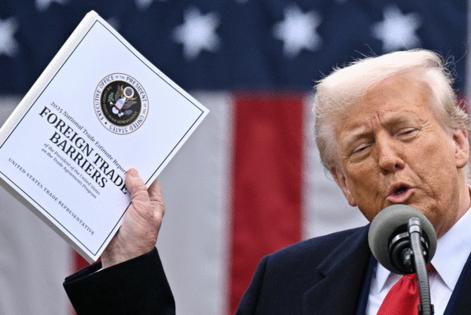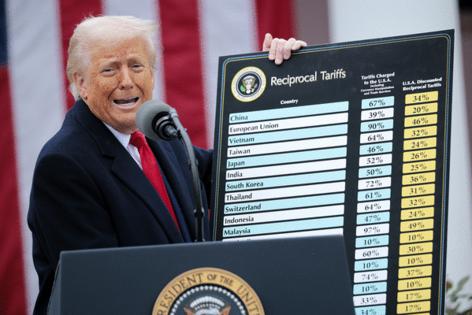Trump declares 'Liberation Day,' announces sweeping tariffs on goods worldwide
Published in News & Features
WASHINGTON — President Donald Trump unveiled sweeping tariffs in a Rose Garden speech Wednesday that was closely watched by world leaders anticipating convulsions in global markets.
In an effort to bring manufacturing back to the United States, Trump said he would slap what he called “reciprocal tariffs” on countries that currently tax U.S. goods.
He dubbed Wednesday “Liberation Day,” and said it would “forever be remembered as the day that American industry was reborn, the day America’s destiny was reclaimed, and the day that we began to make America wealthy again.”
He accused nations the world over, “friend and foe alike,” of having “looted, pillaged, raped and plundered” the United States.
“Our country and its taxpayers have been ripped off for more than 50 years, but it is not going to happen anymore. It’s not gonna happen,” he said. “This is one of the most important days, in my opinion, in American history. It’s our declaration of economic independence.”
The new tariffs are in addition to a 25% tariff on all foreign-made automobiles that Trump announced last week, and which is scheduled to take effect Thursday morning.
The exact nature of the tariffs was kept a mystery until the last moment, with Trump meeting with economic advisers as late as Tuesday afternoon to finalize details, White House press secretary Karoline Leavitt said.
Trump has been advocating for tariffs since the campaign trail, trumpeting the idea that foreign countries have been ripping off the United States for decades.
Several countries are expected to issue tariffs in return, ratcheting up the likelihood of a global trade war. While Trump acknowledged the tariffs are likely to bring “a little disturbance” to the markets, he has underscored that their purpose is to reignite the American economy. White House officials have repeated that tariffs will be lifted on companies that decide to move their manufacturing to the U.S.
Trump began his presidency with a burst of taxes against foreign imports from Canada and Mexico, alleging that those countries were responsible for a fentanyl crisis in the U.S. The tariffs were then delayed twice, and a pause on them is set to expire Wednesday.
“He wants to break us so that America can own us,” said Canada’s Prime Minister Mark Carney in a video Wednesday. “That will never happen. And our response to these latest tariffs is to fight, is to protect and to build.”
Leaders around the world had been on edge for weeks ahead of Trump’s announcement. The anxiety has been particularly acute in Mexico, which does more trade with the United States than any other nation.
Last year Mexico exported more than $500 billion in merchandise — including vehicles, computers, oil and gas — to its northern neighbor. At the same time, it imported $334 billion in U.S.-made goods.
Last month, Trump briefly imposed 25% tariffs on imports from Mexico and Canada, threatening the more than three decades of free trade between the countries that had helped turn North America into a commercial colossus.
In Mexico, which had seen a boom in manufacturing by global companies looking to send their products to the United States tax-free, businesses have held back from new investments.
The economy is now not expected to grow at all in the coming year, and economists warn a trade war could trigger a recession.
Mexican President Claudia Sheinbaum has taken a cautious approach, seeking to mollify Trump. Unlike Canada, she did not slap tariffs on U.S. imports when Trump briefly imposed tariffs on Mexican goods.
On Wednesday, before Trump’s announcement, Sheinbaum said Mexico would respond Thursday with “a comprehensive program” to counter the new tariffs but suggested that Mexico would not respond with tariffs of its own. “It’s not a matter of ‘if you impose tariffs on me, I impose tariffs on you,’” she said.
Domestically, Democrats have persistently blasted Trump’s tariffs agenda as harmful to Americans, who are likely to face higher prices on everyday imported goods.
A majority of American adults — 58% — agree that tariffs will hurt the national economy, according to a Marquette Law School poll released Wednesday. Democrats are more convinced than Republicans — 89% of Democrats and 58% of independents said tariffs will hurt the economy, compared to 52% of Republicans who think tariffs will help.
_____
(Los Angeles Times staff writers Pinho and Wilner reported from Washington and Linthicum from Mexico City.)
©2025 Los Angeles Times. Visit at latimes.com. Distributed by Tribune Content Agency, LLC.










Comments